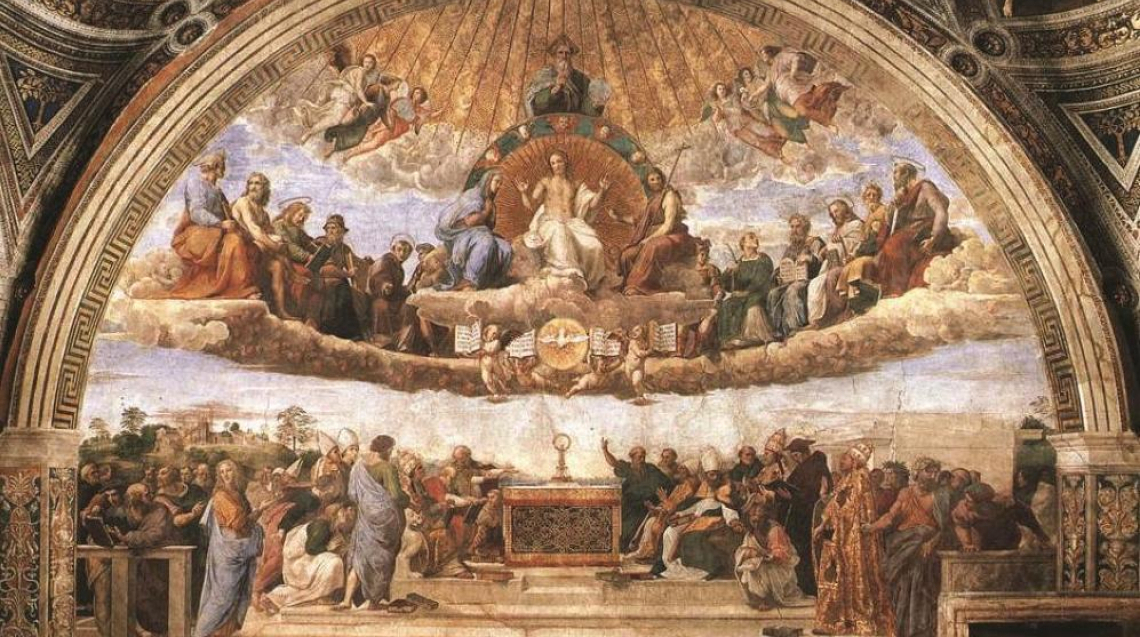The Nicene Creed, Part 2

"I believe in …”
Before we examine the articles of the Nicene Creed themselves, it is worth taking some time to reflect on what we are saying about them as we recite the creed, especially during Sunday Mass. We repeat the phrase “I believe in…” again and again. What does this mean? Why do we say it in this way?
Isn’t it strange, first of all, that we say “I believe in” and not “we believe in”? Wouldn’t it make more sense, especially when reciting the creed as a Catholic community at Mass, to say “we believe in”? Wouldn’t “we believe” better reflect our identity as the corporate body of Christ?
Actually, no. An interesting psychological thing happens when a group of people say “we believe in” or “we will.” Each individual person will be tempted to push the responsibility and the commitment onto the group and not take it on individually. We recognize that temptation in the political world and the business world, as well as in the Church community itself. We want to make it someone else’s burden, not our own. Paradoxically, saying “we believe in” can weaken our sense of belonging to the community and of playing our individual roles in it.
When each person says “I believe in …”, two things happen. Firstly, each individual makes a personal commitment before the group. I believe. I promise the community that I embrace this faith which I am proclaiming. Secondly, each individual hears everyone else make the same individual commitment. No one is excusing themselves from it. Everyone is taking responsibility and committing themselves before all. Moreover, each person feels the commitment of the others and is strengthened by it. For these reasons, saying “I believe in” is more of a community-building statement than to say “we believe in.”
We’ve briefly looked at why we say “I.” Now, what does it mean that we say “believe in,” and not simply “believe.”
The two expressions are not the same, even in our usual ways of speaking with one another. If I say, “I believe you,” I am saying that I find your words trustworthy. I accept them as true. I am saying that you are not trying to deceive me but are expressing the truth to the best of your ability.
If I say “I believe in you,” that means something more. It includes the sense of “I believe you” that we just spoke of, but it goes further. In saying this, I’m saying something about your character and about my relationship with you. It isn’t only your words that are truthful; YOU are. You are worthy of my commitment and friendship. You are reliable, trustworthy, and a person of integrity. If you tell me, “I have your back,” I can trust that with my very life.
As we recite the creed, we say, “I believe in God” and so on. The same applies here. We are saying, first of all, that we believe God. God’s word is trustworthy. God does not lie or deceive when He speaks to us.
We are also saying that we believe in God. It’s not only God’s word that we trust; we trust God Himself. God is supremely worthy of our commitment, love, and friendship. God is worthy to be loved with all our heart, soul, mind, and strength. God will not fail us. God will have our backs.
We can go still further. In the original Greek of the New Testament, it is commonly expressed by pisteuein eis (literally, believing into, not merely in, God). I believe into God. This faith that I profess in reciting the creed draws me into the very life of God. It is not merely believing things about God, though it includes that. Dogmas are essential signposts. It’s about sharing the very life of God, which is poured into the hearts of everyone who believes in God. It’s about becoming like God. It’s the very reason why God became human – that we humans could become like God.
The next time you recite the Nicene Creed at Mass, note what you are saying about your own commitment to God. I believe God. I believe in God. I believe into God. Let that faith permeate you, touch you wherever you are at that moment, and raise you up in complete openness to the God who loves and saves you.
Father Mark Nolette










